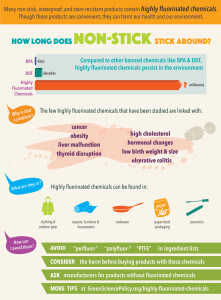May 2015: Trading Health for Waterproof Clothing?
In this edition:

Big news: The Madrid Statement, documenting the consensus of over 200 scientists on the extreme persistence and potential for harm of the entire class of highly fluorinated chemicals, was published May 1 in Environmental Health Perspectives (EHP). Our webpage with more information about avoiding exposure is here. An article in National Geographic is here and one in Science is here.
Our philosophy that scientists should use their research for the public good got a boost when the editor of Environmental Science &Technology, wrote an editorial about our work and the need for scientists to engage in policy. He said, “We need to step outside of our comfort zones. It is an effort that is not recognized in tenure, promotion, or the establishment of a scientific reputation, but sometimes it pays off in the form of a safer, more sustainable world.”
I am just back from our Science and Policy of POPs workshop in Beijing where we met with scientists, government and industry representatives who want to reduce toxics in China and find the Six Classes very useful. You can view the workshop’s PowerPoint talks in both English and Chinese here.
You are invited to the Berkeley Himalayan Fair, at Live Oak Park May 16 and 17. The fair will support earthquake relief in Nepal. Good places to donate include SEVA and the Gorkha Foundation, who work in levelled villages near the epicenter.
I hope to see you at the Himalayan Fair or at one of our upcoming meetings listed below.
Have a happy May 1,
Arlene and the Green Science Policy team
The True Cost of Stain Proof Products — Your Health

Over 200 scientists from 38 countries have reached consensus: the entire class of highly fluorinated chemicals is extremely persistent, potentially toxic, and should be replaced with safer alternatives.
Highly fluorinated chemicals (also known as PFCs and PFASs) can make products stain-resistant, nonstick, or waterproof. They are used, for instance, in outdoor and fashion clothing, carpets, furniture, cookware, food contact paper, and some cosmetics. However, these conveniences come at a cost.
Exposure to some highly fluorinated chemicals has been linked to a wide range of health problems including cancer, liver malfunction, hypothyroidism, obesity, ulcerative colitis, lower birth weights and sizes, and decreased immune response to vaccines in children. Many highly fluorinated chemicals continue to be used in consumer products without information on potential adverse health effects.
These chemicals can persist for as long as millions of years in the environment, which means that future generations will continue to be exposed via contaminated water, air, and food. They are already found deep in the ocean, on mountains tops, and in nearly all living creatures.
“Every second, highly fluorinated chemicals are leaching out of the clothing, carpets, and food packaging we use everyday,” said Arturo Garcia-Costas of The New York Community Trust, a major funder for the Green Science Policy Institute’s work on reducing the use of classes of harmful chemicals. “Once these extremely persistent toxic chemicals make their way out of these products and into our bodies and the environment, there is no going back. Classes of chemicals like this should be proven safe before they’re used in consumer products.”
To reduce exposure, avoid products that are oil- or stain-resistant, such as certain carpets, table cloths, food contact paper; avoid nonstick cookware; purchase waterproof gear only when you really need it; avoid cosmetics with PTFE, “perfluor” or “polyfluor” in their ingredients list. For more tips, visit greensciencepolicy.org/highly-fluorinated-chemicals.
Receive Updates By Email
Subscribe to our monthly newsletter and get these updates delivered right to your inbox!